




PRESIDENT’S REPORT 2024
As Chaminade University of Honolulu approaches its 70th year since its founding in 1955, the institution has achieved remarkable milestones in science, art, technology, culture and beyond, profoundly impacting communities in which we live. Indeed, we stand as a beacon of excellence, embodying the essence of an extraordinary place of study. However, in this pivotal moment for higher education, we recognize that the landscape is rapidly evolving.
Each day, our students and alumni confront the challenges of a dynamic global marketplace, where innovation and adaptability are paramount. Our society grapples with intricate problems that demand interdisciplinary and entrepreneurial solutions. Yet, amid these complexities, the imperative remains clear: Chaminade must remain accessible and affordable for all, despite the burgeoning demand and finite resources.
Accessibility and affordability are core values at Chaminade, and we have taken concrete steps to ensure both. Matching the University of Hawai‘i at Mānoa's tuition rates, we provide families in Hawai‘i with more choices for higher education. Furthermore, our four-year graduation guarantee demonstrates our commitment to supporting students on their academic journey.
At Chaminade University, we refuse to succumb to complacency. Instead, we are called to embrace change, to adapt and to evolve continuously. We are charting new courses, pushing boundaries and embarking on transformative endeavors to meet the needs of our communities. We are also extending our impact globally and securing our future.
Five fundamental priorities underpin our mission: ensuring the lifelong academic success of our students; fostering a sense of well-being and inclusivity; respecting our place and values; embracing adaptation; and partnering with communities to achieve service, justice, peace and the integrity of creation. These principles serve as our compass, guiding us toward an ever-greater Chaminade University—one characterized by creativity, curiosity, interdisciplinary collaboration and global interconnectedness.
I am incredibly proud of the progress Chaminade University of Honolulu has made in the last two years. We will continue to evolve, always ready to pivot and contribute meaningfully to the education and well-being of our community.
Lynn Babington, Ph.D. President Mahalo,

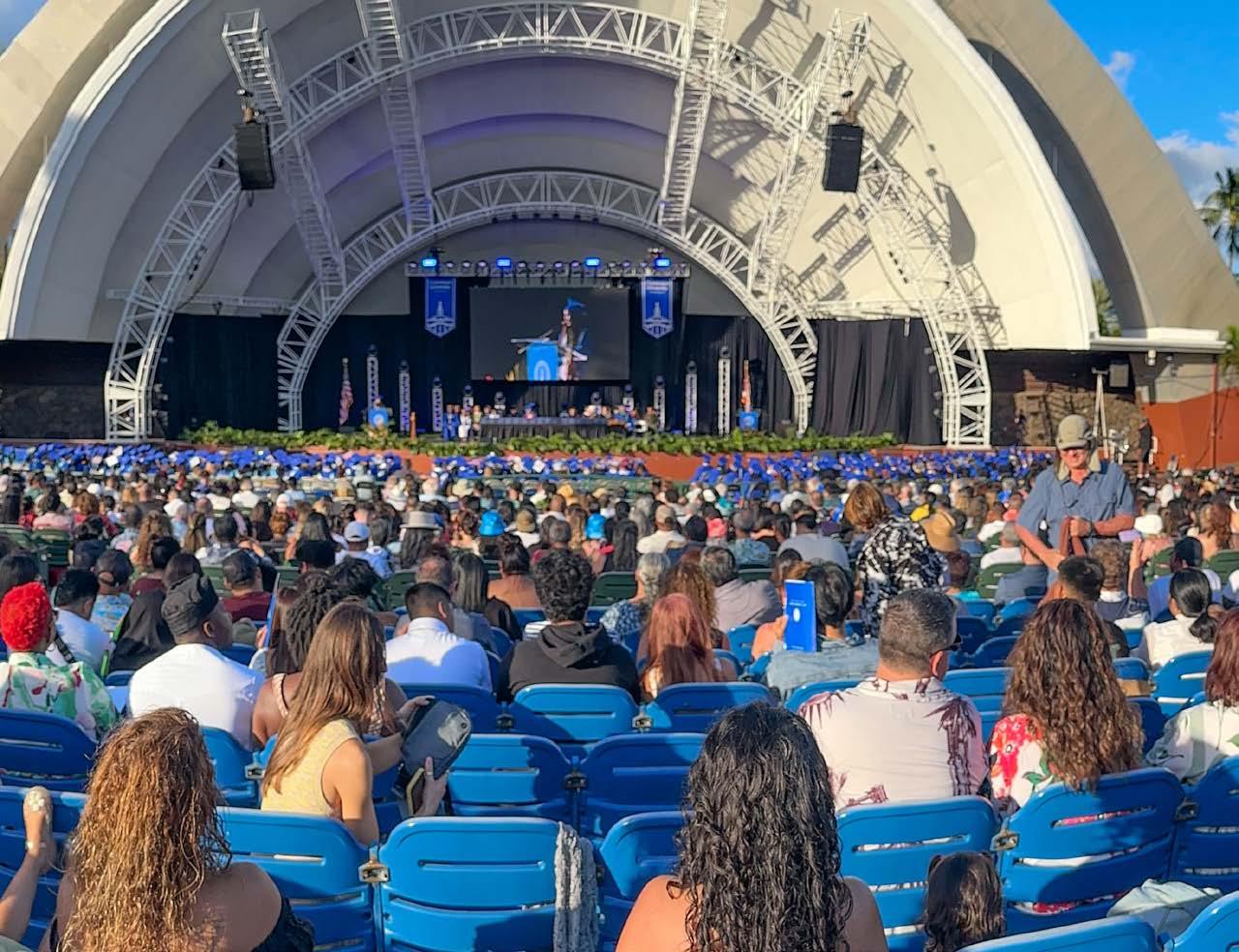
From the cobblestone streets of Europe to the steppes of Asia, the Chaminade community extends across the globe, connecting alumni and supporters from the four corners of the world. In celebrating our differences, we unlock the power of collaboration, igniting innovation and driving transformative change. At Chaminade, we are committed to the relentless pursuit of excellence, innovation and relevance in all aspects of our academic endeavors. Yet, at the heart of our mission lies an unwavering dedication to service. Serving others is not just a task; it is our guiding principle, our compass that directs our actions and shapes our purpose.
6 DEG REES ASSOC IATE’S DEG REES BACH E LOR’S 24
6 DEG REES MAS TER’S
5 DEG REES DOCT ORAL
Admissions Graduate Admissions
TRANSFORMING LIVES THROUGH A HOLISTIC EDUCATION

EDUCATING FOR SERVICE, JUSTICE, PEACE AND INTEGRITY
NURTURING TOMORROW ’ S COMMUNITY LEADERS
PRIORITIZING WORKFORCE NEEDS AND DEMANDS
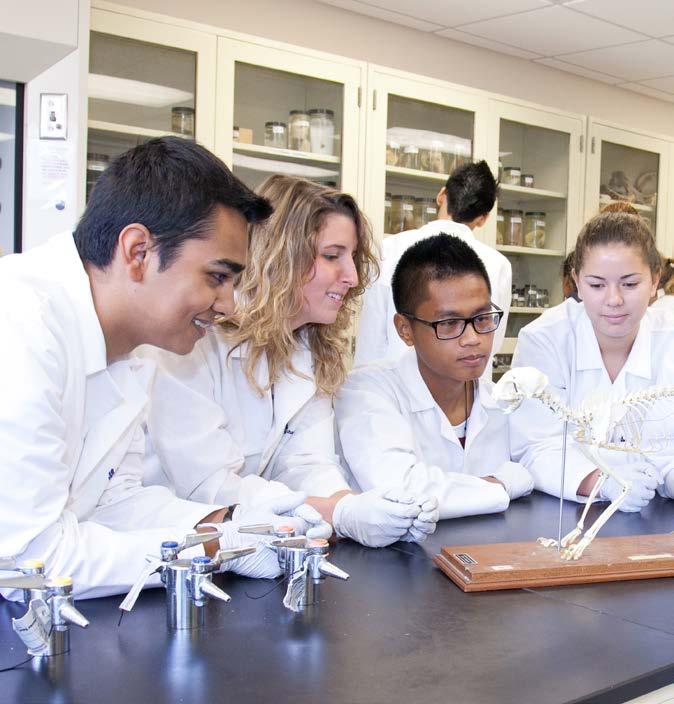

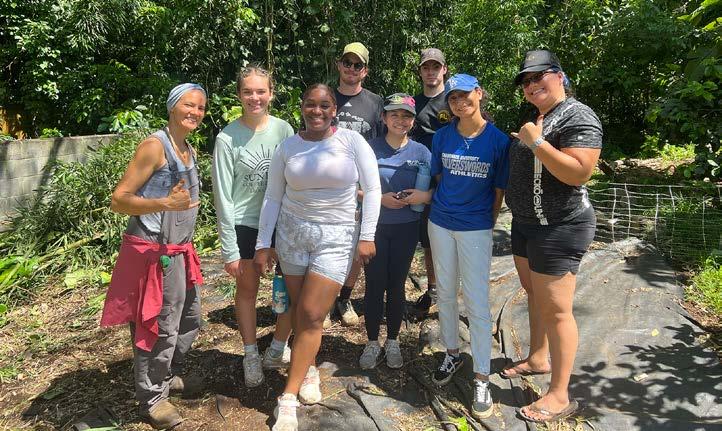
At the core of a Chaminade University education lies the belief that every student holds the potential and desire to contribute substantial positive change. Empowered as leaders and perpetual learners, our Silverswords are equipped to cultivate a society characterized by diversity, justice, peace and integrity. Our new 2024–2030 Strategic Plan, Pūpūkahi i Holomua, is the culmination of our shared vision for growth, excellence and holistic development, building upon our rich history and the foundation of our host culture here in Hawai‘i. With the changing dynamics of higher education, including shifting demographics, technological advancements and an increased awareness of the diverse needs of students, Chaminade is well prepared to pivot to address these challenges.
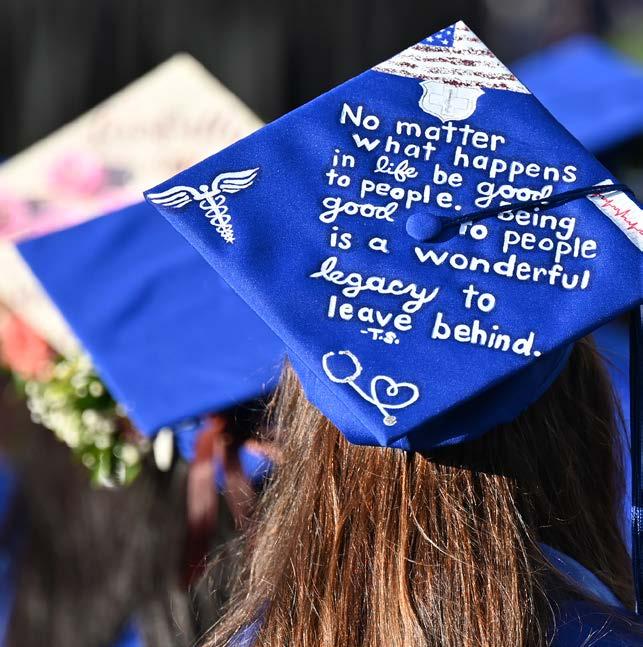
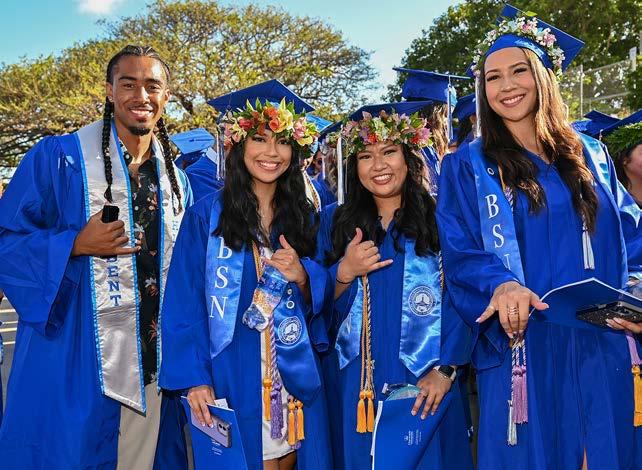
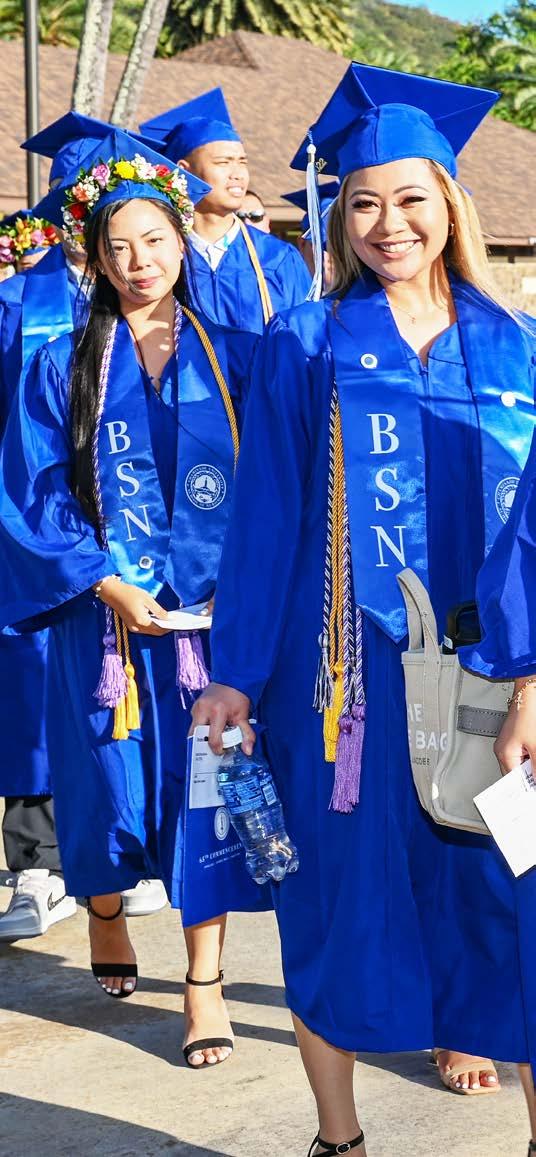
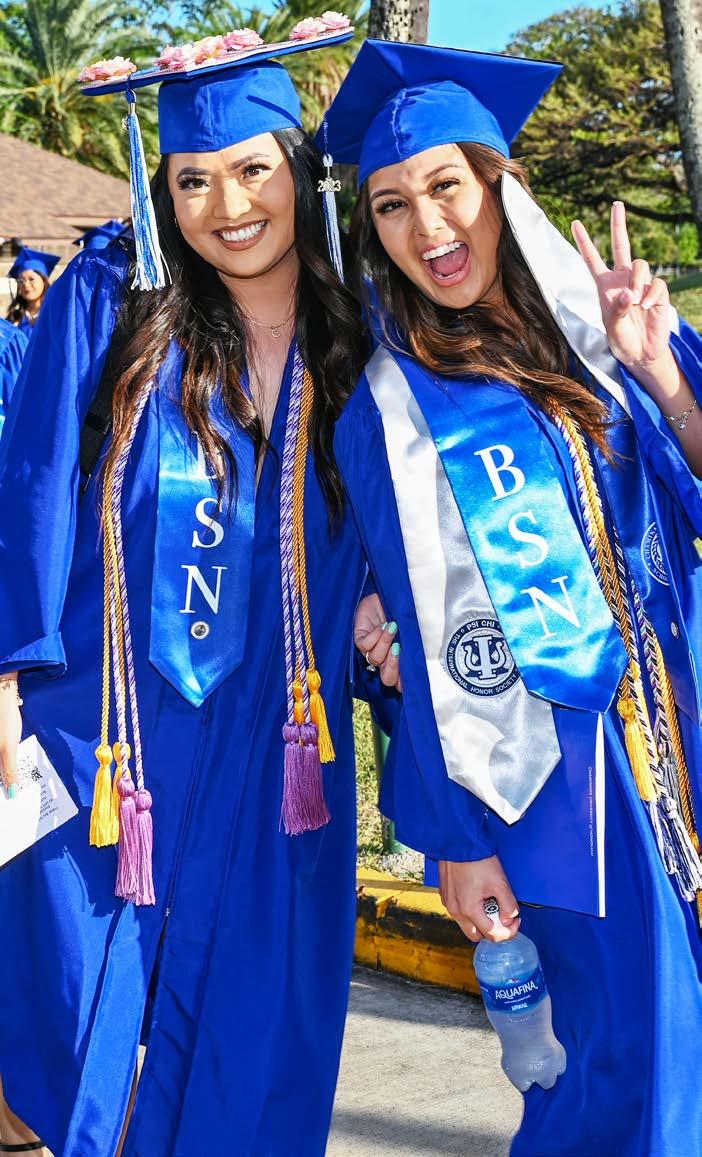

The age-old adage that nothing in life is guaranteed doesn't apply when it comes to tuition at Chaminade. Last fall, the University took a bold step by guaranteeing that all incoming freshmen from Hawai‘i would be able to afford the tuition at Chaminade University. In addition to the predictable tuition rates, the Hawai‘i Guarantee program offers various financial aid opportunities, including scholarships, grants and work-study programs, to further reduce the financial burden on students, and to ensure that all students have access to the resources they need to succeed academically and professionally. This commitment provides students and families with financial predictability and underscores Chaminade’s dedication to making higher education more accessible and affordable. This effort is really a part of Chaminade’s serviceoriented mission, which is to make higher education accessible to all Hawai‘i students. Across the country, less than half of students graduate on time. Our Hawai‘i Guarantee is designed to help students map out their academic journeys, and receive the course offerings and advising support needed to get them there. They will have a clear path to a four-year graduation.
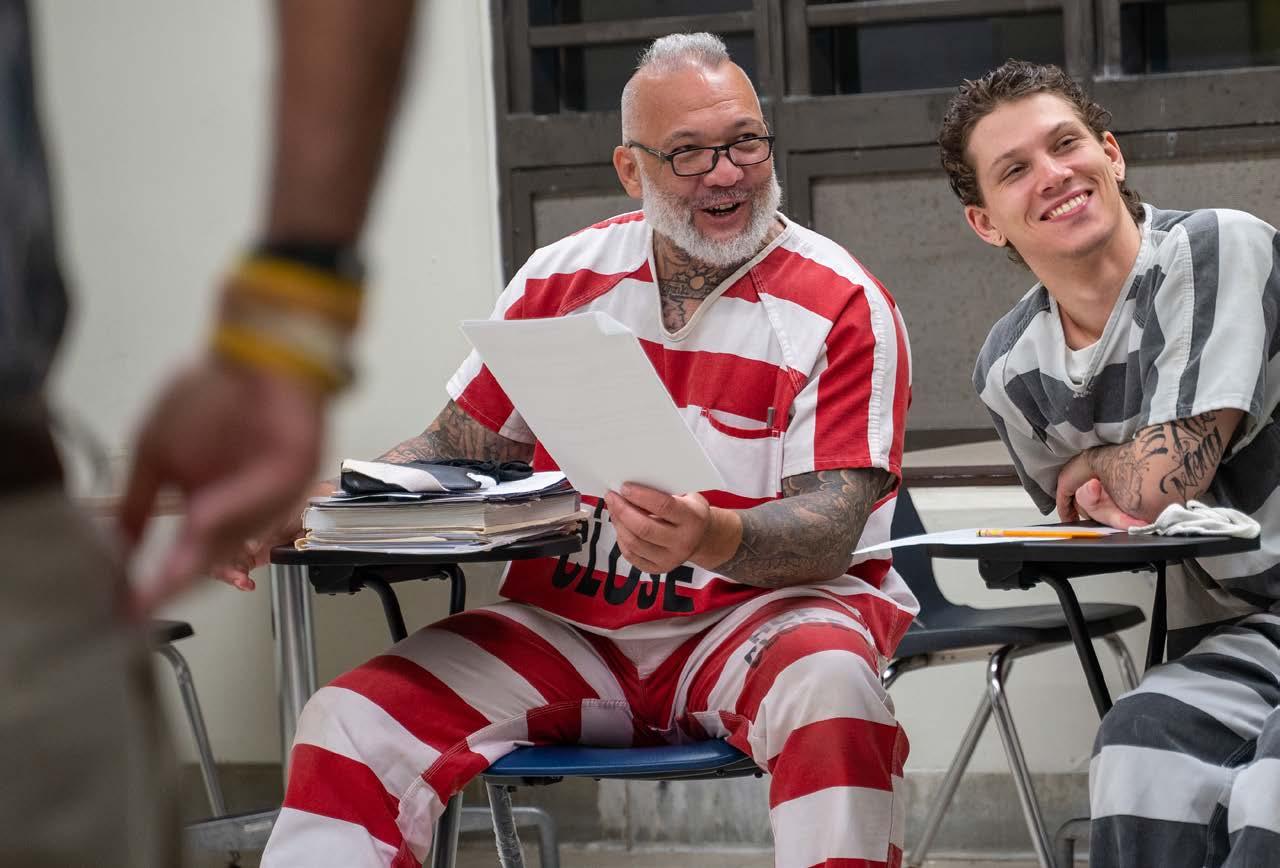
Through our ongoing commitment to serving underprivileged or underrepresented student populations, we aim to break down barriers to success, empower individuals to reach their full potential, and create a more just and equitable society. Across all our academic programs and as an institution, we strive to provide innovative, excellent and relevant programs that meet the diverse needs of our students across the educational spectrum. Whether it's through scholarship opportunities, mentorship programs, or tailored support services, we are dedicated to ensuring that every student has the resources and support they need to thrive. And we will be even more relevant to the needs of our students, while expanding our service to the people of Hawai‘i.
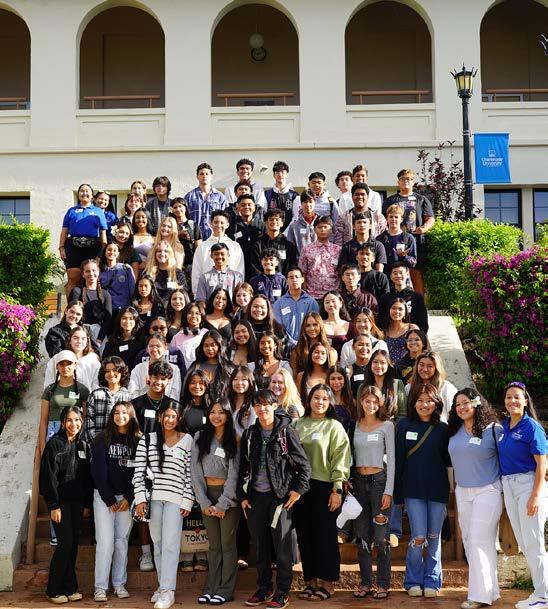
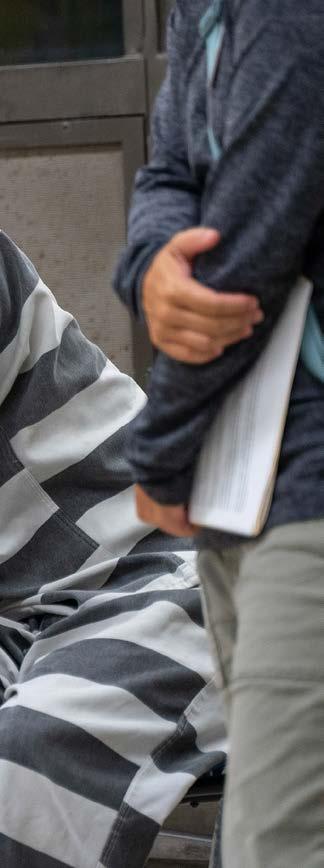
In 2023, Chaminade celebrated a significant milestone by graduating its inaugural cohort of incarcerated students, awarding them associate’s degrees in Business Administration. With support from a $750,000, three-year grant from the Andrew W. Mellon Foundation and a $1.5 million earmark in congressionally directed spending, Chaminade University of Honolulu is now positioned to expand its Higher Education in Prison (HEP) program, which aims to be a pathway for participants to leave incarceration with new identities, perspectives and goals to help them thrive in society. The goal is to expand degree offerings to include an Associate of Arts in Liberal Arts that can be extended to a BA in Interdisciplinary Studies. Chaminade’s HEP program originally served only males who are incarcerated at Hālawa Correctional Facility. Moving forward, the University plans to extend its cohort model HEP program to the Women’s Community Correctional Center (WCCC), as well as to those men serving time at the Saguaro Prison in Arizona. The coursework for the three degree programs will emphasize a humanities and liberal arts curriculum, and will be offered in a culturally responsive and trauma-informed way that will be relatable with the overrepresented indigenous prison population. Embracing higher education within the prison system signifies a commitment to justice that extends beyond punishment, striving instead for meaningful rehabilitation and long-term societal transformation.
As part of Chaminade’s service-oriented mission to make higher education accessible to all Hawai‘i residents, students from Sacred Hearts Academy, Saint Louis School and Kapa‘a High School on Kaua‘i, are participating in the University’s Early College Program, allowing them to either earn an Associate of Arts degree or early college credit. Early college programs can provide several benefits, including the opportunity for students to accelerate their education, which can lead to the completion of college degrees at an earlier age.
Research further demonstrates that early college programs show strong and lasting evidence of effectiveness for all students. It promotes both post-secondary access and success. The data is undeniable that students who participate in such programs will be ahead of their peers and can graduate from a four-year university either debt-free or with very little federal student loan debt. The latest data from the American Institutes of Research also support the claim that students who participate in these programs are better prepared to transfer to a four-year university than students who attend university without prior college experience.
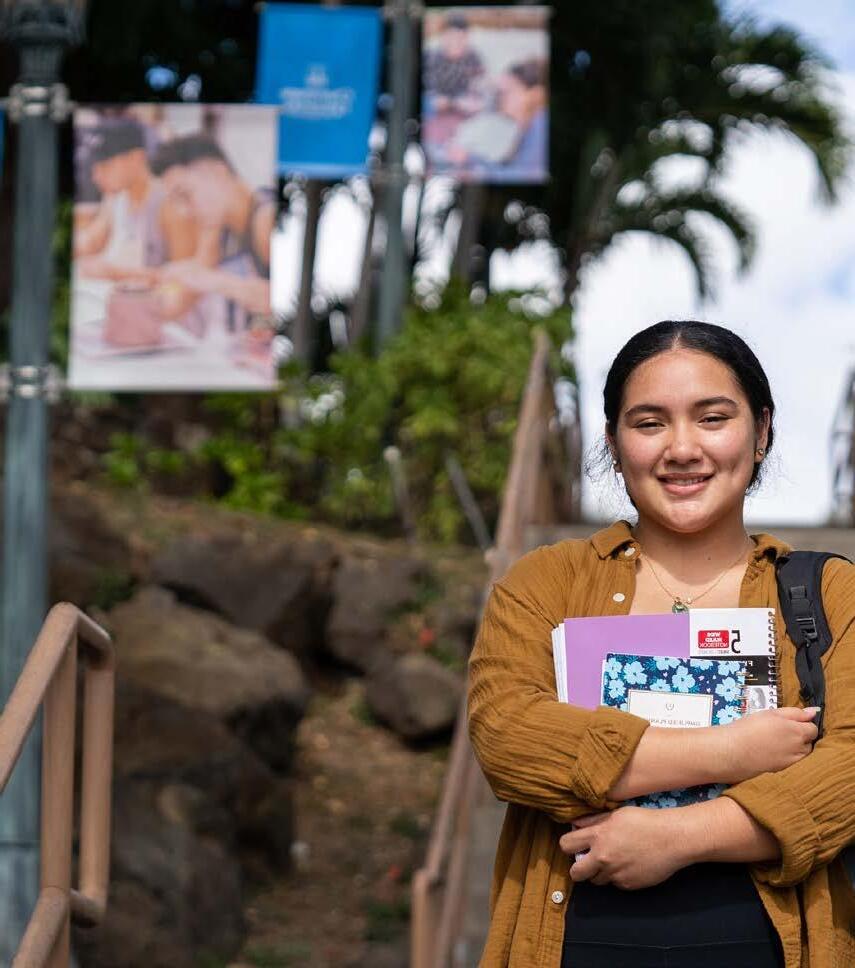
A Catholic Marianist university, Chaminade educates in an academically challenging, intellectually vibrant and collaborative community, preparing our students for lives of purpose, thoughtful inquiry and responsible leadership in a diverse world. Though we are a relatively young institution, we have a proud history.
Chaminade was founded in 1955 under the guidance of five Marianists eager to establish a Catholic institution of higher education in Hawai'i. Over the decades that followed, we have seen remarkable growth, earning a national reputation for excellence and innovation. Still, the core of our mission has remained the same—that of making the dream of a quality, private education more attainable for the families and communities we serve.
Our overall goal is to continue to provide a holistic education and graduate students who contribute to their communities. The impact of Chaminade University certainly extends far beyond our campus border.
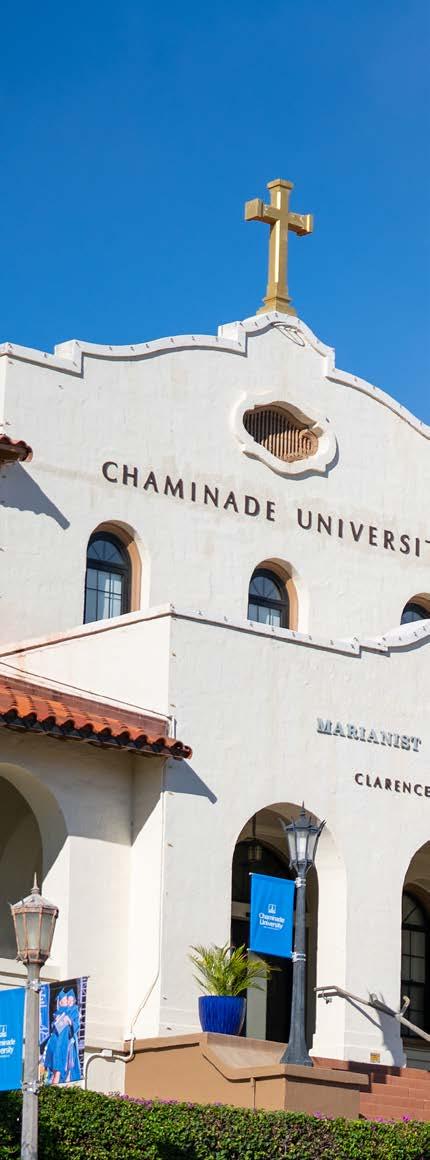
95%
#1
Undergraduate students received some form of financial aid (AY 2022-23)

Best College Locations in Hawaii (Niche, 2024)
College with the Best Student Life in Hawaii (Niche, 2024)
#30 Regional Universities West (U.S. News & World Report, 2024)
#10 BEST VALUE SCHOOLS (U.S. News & World Report, 2024)
#29 TOP PERFORMER ON SOCIAL MOBILITY (U.S. News & World Report, 2024)
$23.4 million in total grants awarded in 2022-23.
$10 million National Science Foundation Alliance Grant to elevate historically underrepresented populations across Hawai‘i and the Pacific Region.
As society becomes more pluralistic, Catholic and Marianist universities must ensure that their campuses are welcoming to people of all backgrounds and faiths. At Chaminade, we strive to create an environment where open dialogue and respectful exchange of ideas can flourish. We produce graduates who are not only academically competent but also compassionate, ethical and dedicated to making a positive impact on society.
$600,000 federal grant from the U.S. Department of Commerce’s Minority Business Development Agency to develop a Sustainability Entrepreneurship Program among Hawai‘i-Pacific undergraduates.

Thanks to a two-year $600,000 Minority Colleges and Universities grant competition from the U.S. Department of Commerce’s Minority Business Development Agency (MBDA), Madison Makishima ’25 was able to make adaptive surfboards out of recyclable materials and ocean plastics so people—like her—with disabilities could have access to the ocean. As part of Chaminade University’s ‘Inana Sustainability Entrepreneurship Program, Makishima and eight other fellow students were able to participate in a 10-week summer program that paired them with businesses that align with the United Nation’s Sustainable Development Goals (SDGs).
The focus of the ‘Inana program is to nurture sustainability entrepreneurs in Hawai'i, who will develop businesses that diversify and grow our economy while attending to the health of the planet. This, of course, is consistent with Chaminade’s United Nations CIFAL Center, which is focused on supporting progress toward the UN’s 17 SDGs in Hawai‘i and the Pacific region. Our CIFAL Honolulu Center is the only international United Nations Institute for Training and Research (UNITAR) center located in the Pacific region.
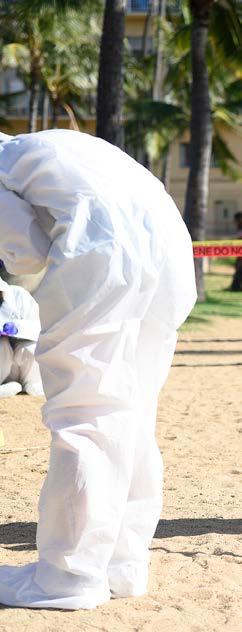
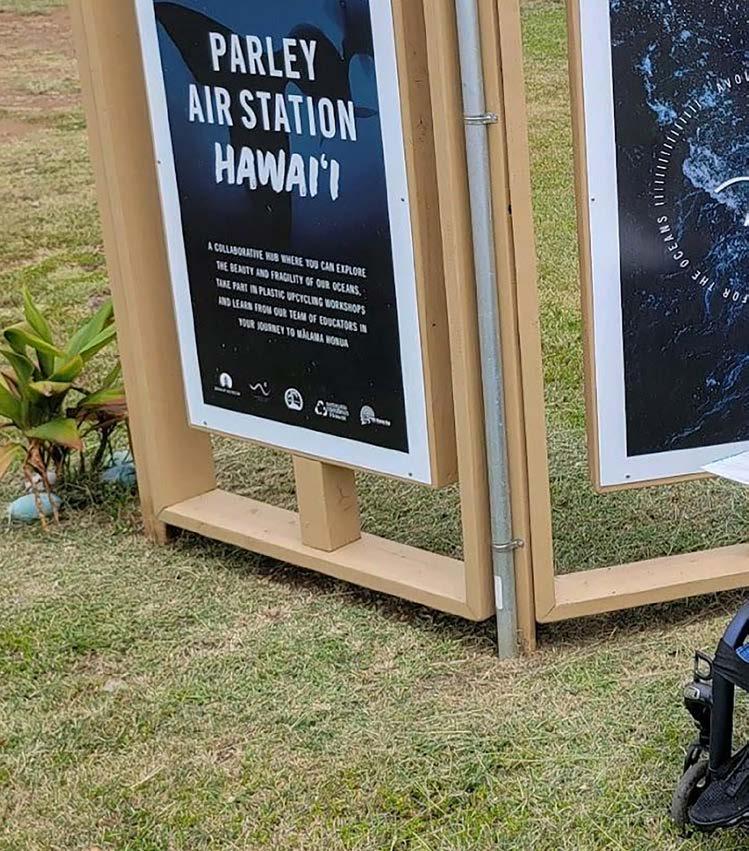


Providing students with a comprehensive understanding of the scientific principles and techniques used in the investigation of crimes and legal proceedings, Chaminade’s Forensic Sciences program has become a recruiting ground for the Hawai‘i Field Office of Naval Criminal Investigative Service, which has hired Chris Meana ’12, Pia Teves ’85, Tamara Kenessey ’16, Olivia DeQuiroz ’12 and Kay Een ’02 as special agents. The five alumni are tasked with monitoring crime, conducting polygraph tests, supporting criminal investigations, and providing analytical support and technical surveillance countermeasures (TSCM). With the nation’s strategic focus shifting towards the Indo-Pacific region, the NCIS Hawai‘i Field Office’s multifaceted capabilities are even more in demand. Stretching from the Pacific coastline to the Indian Ocean, the area is home to more than half of the world’s people, nearly two-thirds of the world’s economy and seven of the world’s largest militaries. And in the years ahead, as the region drives as much as two-thirds of global economic growth, its influence will only grow—as will its importance to the United States.
“Much like my time at Chaminade, I believe there is great value being surrounded by people with different backgrounds, experiences and perspectives,” says Een, Chief Diversity and Inclusion Officer for NCIS. “Being in a place that fosters diversity through inclusion is key to growing an innovative and agile workforce.”
Through their curricula, students share an appreciation for better understanding of the human experience. Armed with fundamental knowledge, adaptable skills and enduring experiences, graduates from our School of Humanities, Arts and Design programs don’t merely enter the workforce—they make a lasting impact. An alumna with a BFA in Environmental + Interior Design, Avery Solomon ’04 partnered with prolific entrepreneur and Serena & Lily CEO Lily Kanter, to open their portmanteau Averylily Design Studio in 2022 and Averylily Home Collection this past January. In the process, Solomon has kept her promise by hiring local designers, including Gerlie “Gigi” Valiente ’17, a fellow Chaminade alumna. “One of our main goals is to keep jobs in Hawai‘i,” Solmssen emphasizes. “We want our local high school and college students to be able to come to our studio, and to develop their skills and apply them in real life.”
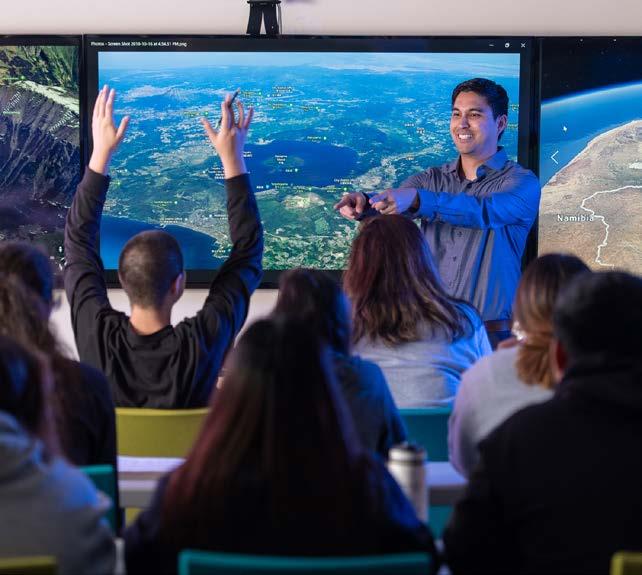
Data science continues to evolve as one of the most promising and in-demand disciplines, and budding data scientists are all too happy to explore the field … one byte at a time. Since the School launched its Data Science major in 2018, every class has been filled to capacity. And four years ago, the National Science Foundation (NSF) selected Chaminade University to lead a groundbreaking $10 million, five-year grant project to create new leadership pathways. With the help of this transformative funding, Chaminade University’s new United Nations sustainability center, CIFAL Honolulu, and Data Science program introduced the University’s new Alliance Supporting Pacific Impact through Computational Excellence (ALLSPICE). Working with a consortium of partners, ALL-SPICE focuses on the application of data analytics to solve critical sustainability issues and promote sustainable development across the Pacific region. The program also focuses on workforce development, providing opportunities for skillsbuilding in data science to meet employer needs in this high-demand field.
“The underlying theme of ALL-SPICE is about building capacity and learning communities in the Pacific to harness the power of technology and data to address challenges,” says Dr. Rylan Chong ’17, Chaminade’s Data Science Program Director. “We focus on social aspects, applied ethics and responsibility working with people and data.”
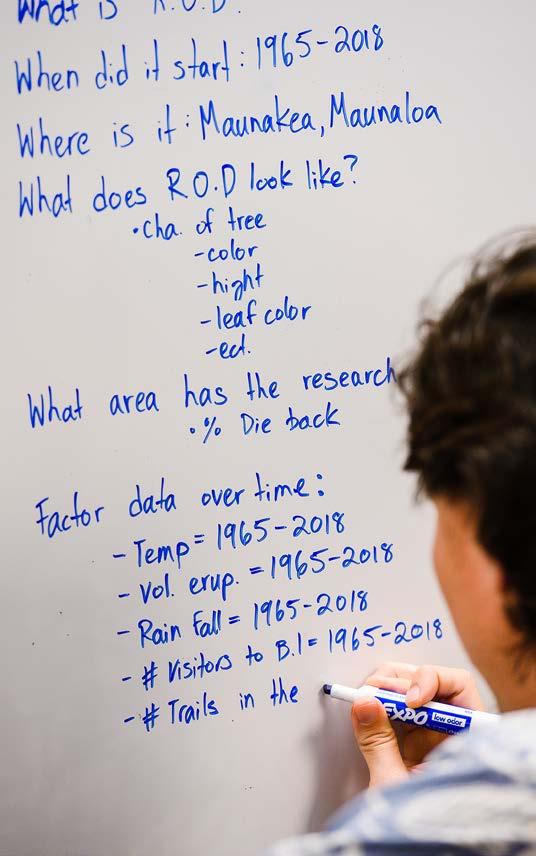
Some of our alumni work at The Queen’s Medical Center while others are employed by Hawai'i Pacific Health and Kaiser Permanente. A few work in telemedicine with Pali Momi and Straub Medical Center. Since the Hawai‘i State Board of Nursing officially gave Chaminade University the green light to launch a nursing program in Fall 2010, the School of Nursing and Health Professions (SNHP) has helped contribute to our community’s healthcare needs in various settings, including hospitals, doctors’ offices, clinics and other environments.
Nursing stands as the cornerstone of the healthcare workforce, yet the demand for nurses is poised to escalate in the coming decade. Chaminade’s nursing program plans to answer that demand. With access to state-of-the-art facilities and guidance from experienced faculty, students receive a strong foundation through hands-on learning, realistic simulations and supportive mentorships.
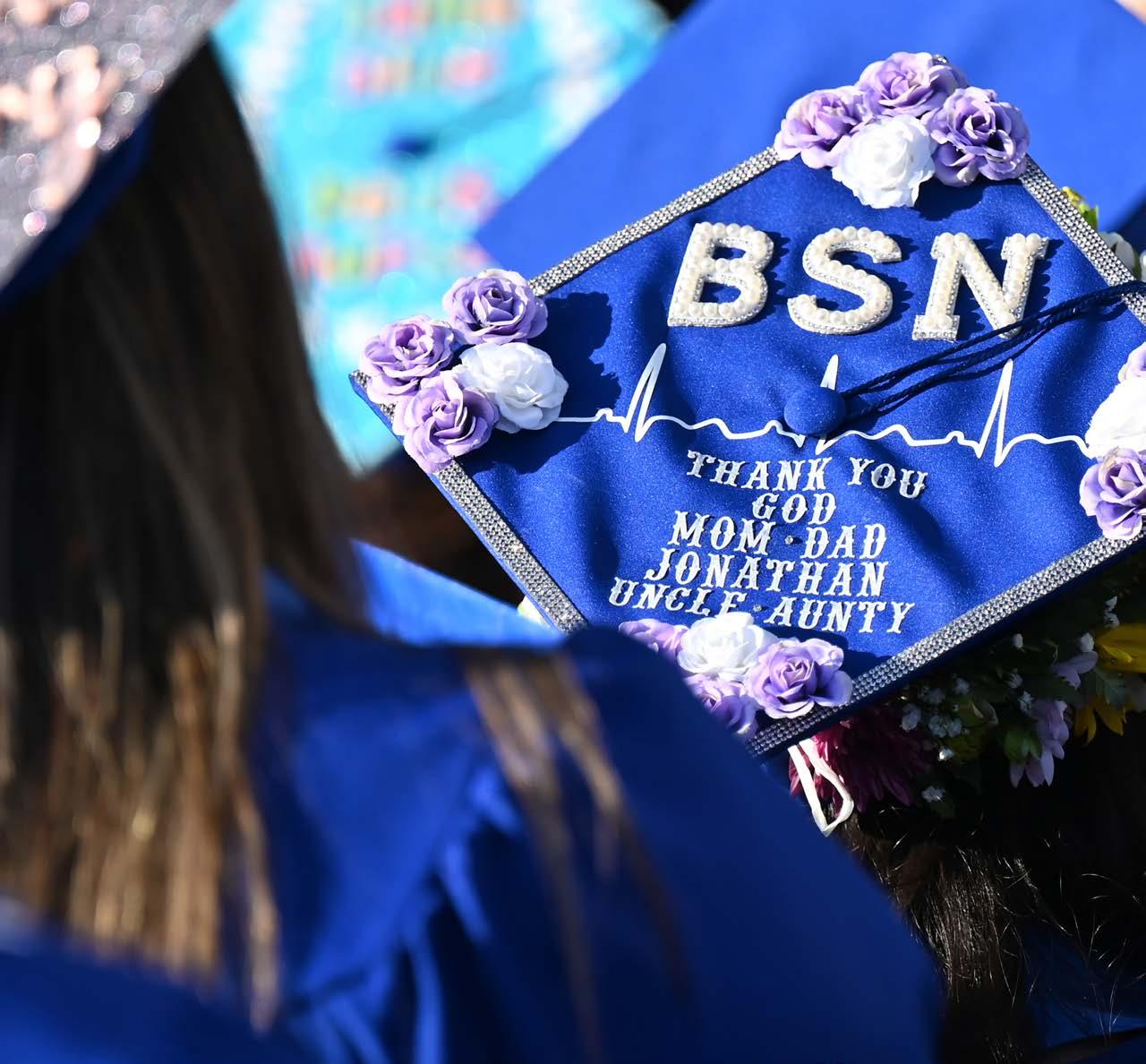
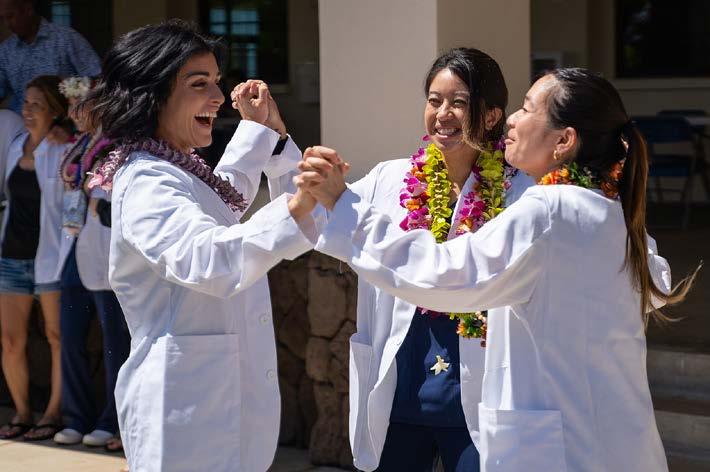
Sports management has indeed undergone significant evolution since its inception. Initially, it predominantly concentrated on the business aspects of sports, such as marketing, sponsorship and ticket sales. However, as the sports industry expanded and diversified, so too did the demand for specialized roles and functions within sports management.
Chaminade University’s Major and Minor in Sport and Event Management are designed to nurture students as future leaders in this industry, placing a firm emphasis on mentorship, experiential learning, networking and internship opportunities, including with Duke’s Oceanfest, Sony Open, Honolulu Marathon and Kalākaua Merrie Mile. Through an interdisciplinary approach, students cultivate a robust knowledge base encompassing sports business administration, sports psychology, sustainability, law, ethics and communication.
According to the Bureau of Labor Statistics, the number of job opportunities within the sports and entertainment sector is expected to grow at a fast rate between now and 2032, with more than 106,000 new positions anticipated each year.
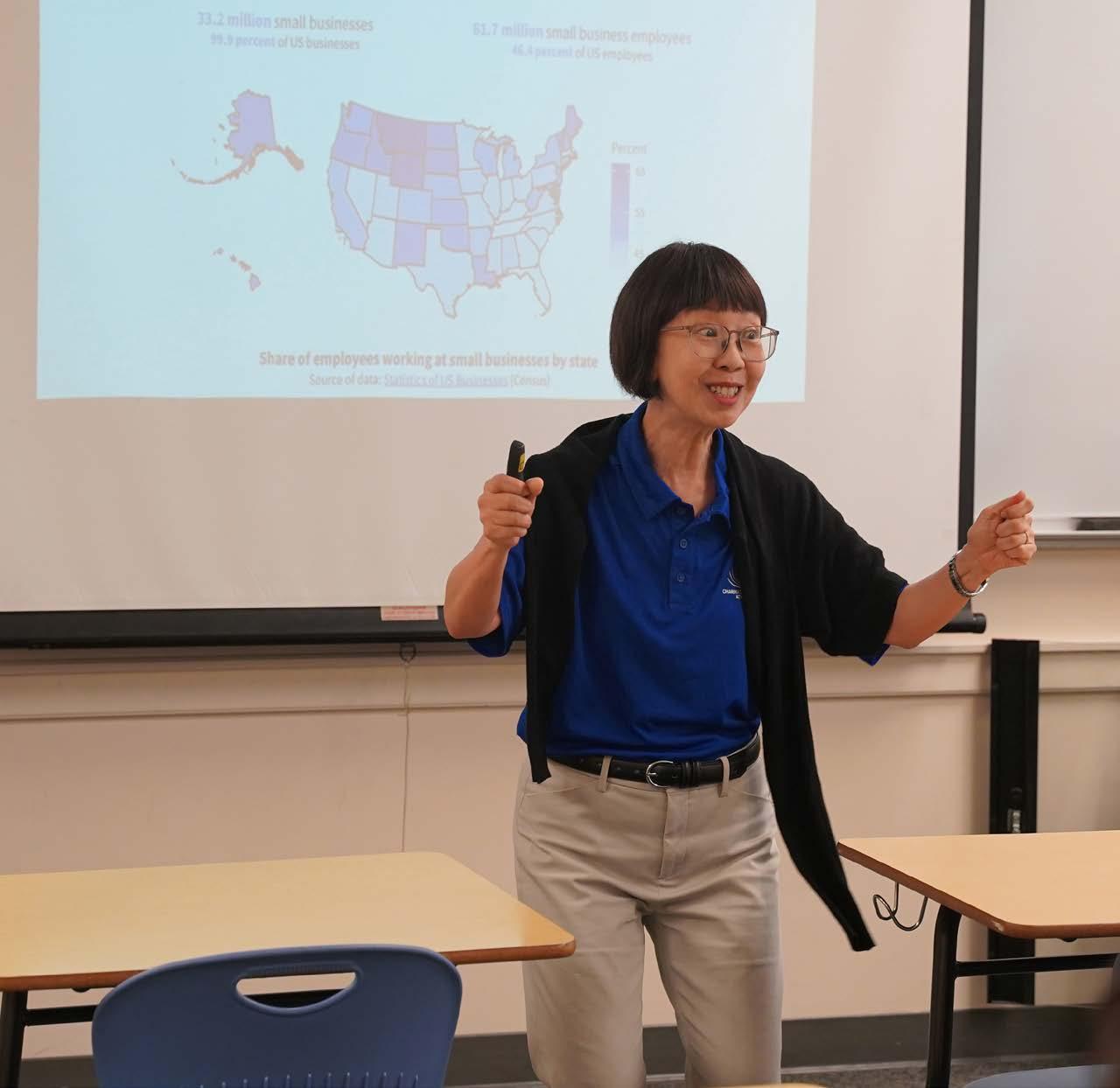
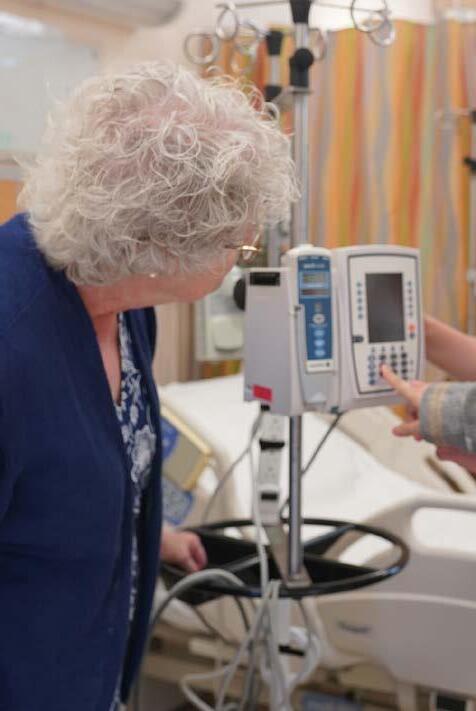
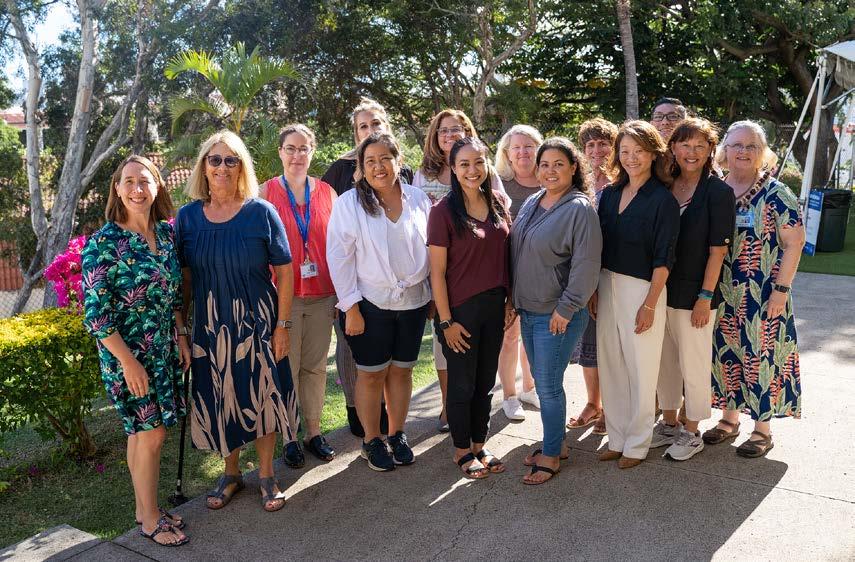
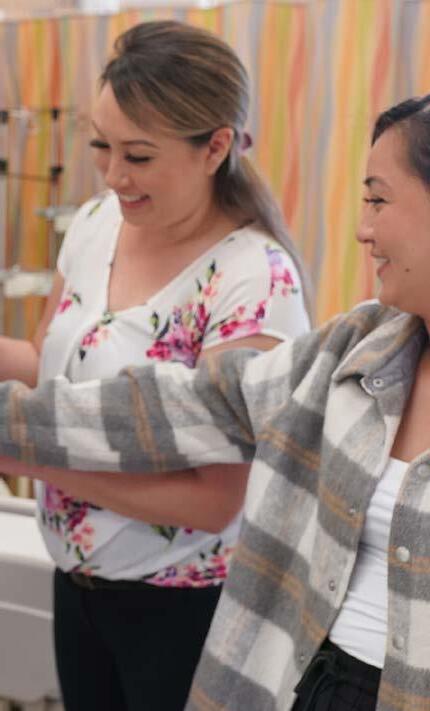
Launched in 2010, the Hawai‘i Physician Workforce project investigates state physician workforce trends. In Hawai‘i, local workforce shortage research indicated a lack of between 519 and 820 physician Full Time Equivalents (FTE) in 2019. In response to this shortage of primary healthcare providers and our aging society in Hawai‘i, Chaminade’s School of Nursing and Health Professions introduced a Doctor of Nursing Practice degree, a terminal degree in nursing that represents the highest level of preparation in nursing practice for nurses seeking a focus on the scholarship of clinical practice, application of clinical skills and the integration of the two.
Chaminade currently has four DNP tracks, including Family Nurse Practitioner (FNP), Pediatric Nurse Practitioner (PNP) Psychiatric Mental Health Nurse Practitioner (PMHNP) and PostMaster’s Executive Leader (EL). In conjunction with specialized nursing expertise, the DNP curriculum prepares graduates to address profound healthcare needs of society, focusing in particular on the needs of the most vulnerable among us at a time when nurse leaders are urgently needed and will continue to be in high demand.
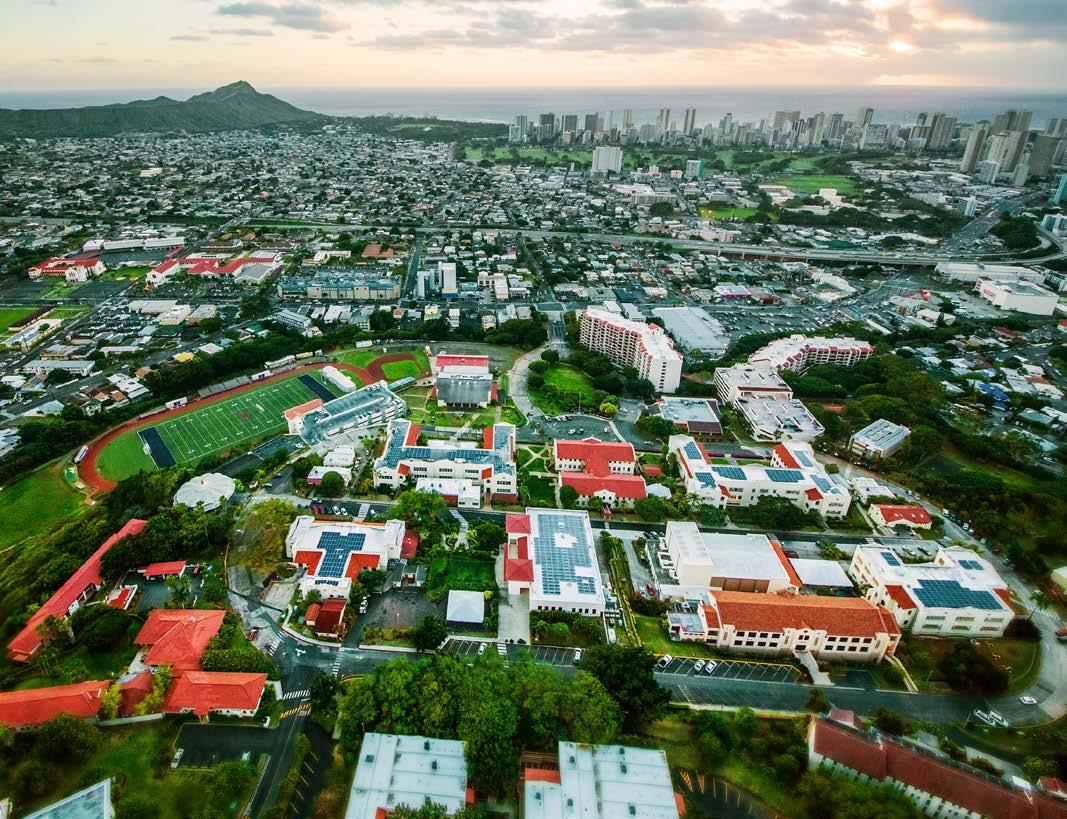
In our pursuit of excellence, we understand that responding to the evolving needs of our communities is paramount. Therefore, we prioritize the development of new programs that directly address community needs, ensuring that our educational offerings are not only academically rigorous but also responsive and relevant to the challenges and opportunities found in the communities we serve.
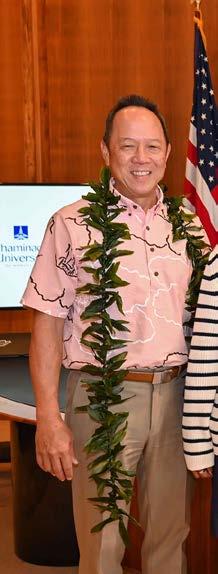
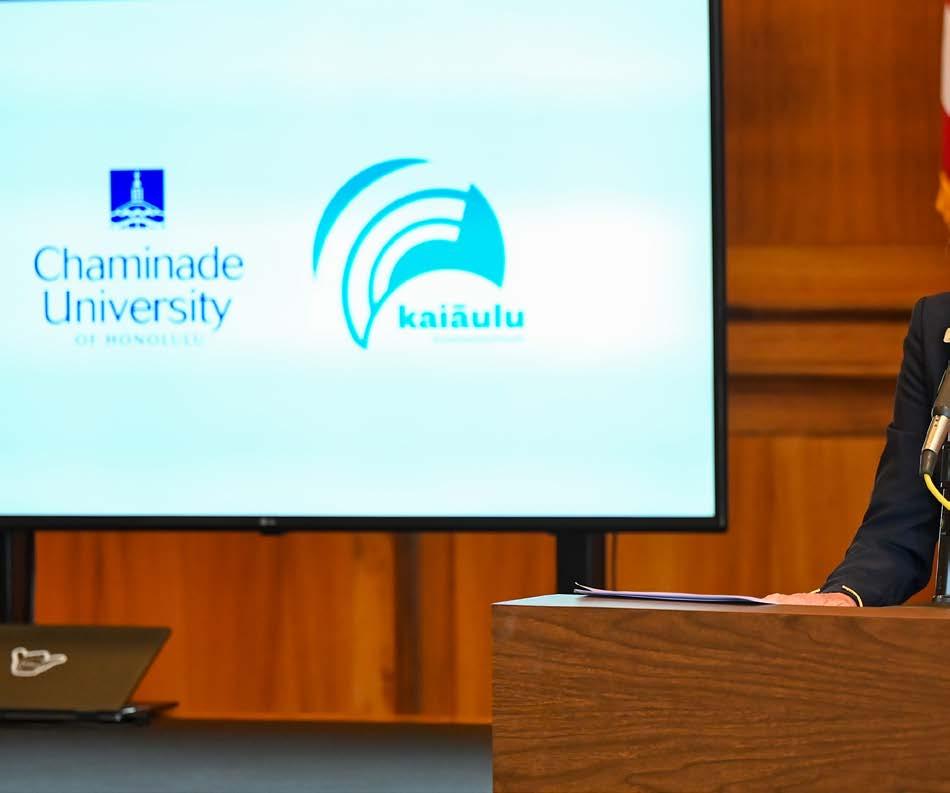
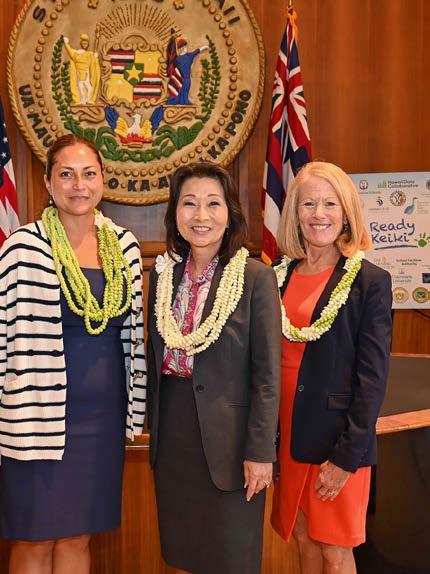
Recognizing the critical need for early education teachers in Hawai‘i, Chaminade University and Kamehameha Schools have established the Mu‘o Scholarship, an innovative and communityfocused teacher prep partnership that will provide tuition funding to educate, train and prepare aspiring teachers to lead Hawai‘i’s classrooms. By providing these scholarships, we’re removing barriers that too often hinder many working adults in the state from obtaining a bachelor’s degree while still maintaining family and work commitments. Mu’o means to bud, and we believe our Mu’o Program will allow us to grow teachers, to bud teachers who will positively impact our communities through their teaching careers for generations to come. This transformative program is 100 percent online, with a requirement to complete a studentteaching track. Students are paired with an academic advisor to guide them on the road to graduation.

As part of an exciting partnership with the Hawai‘i State Department of Education (HIDOE), Chaminade University welcomed its inaugural cohort for the new Doctor of Education in Educational Psychology program in 2022. The EdD program, which is offered fully online, is designed for mental health professionals serving in educational settings and driven to build their skills as leaders, mental health counselors and scholarpractitioners. The doctoral program was developed to help Hawai‘i meet a critical and growing need for advanced clinical professionals in educational settings. “We’re targeting that gap area—between psychologists and students—at the Department of Education,” says psychology professor Dr. Darren Iwamoto. “It’s important that we identify struggling students and get them on a path to academic success and mental well-being.”
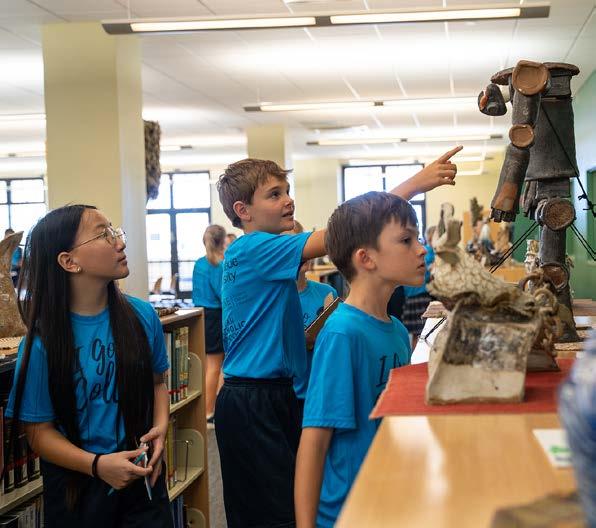

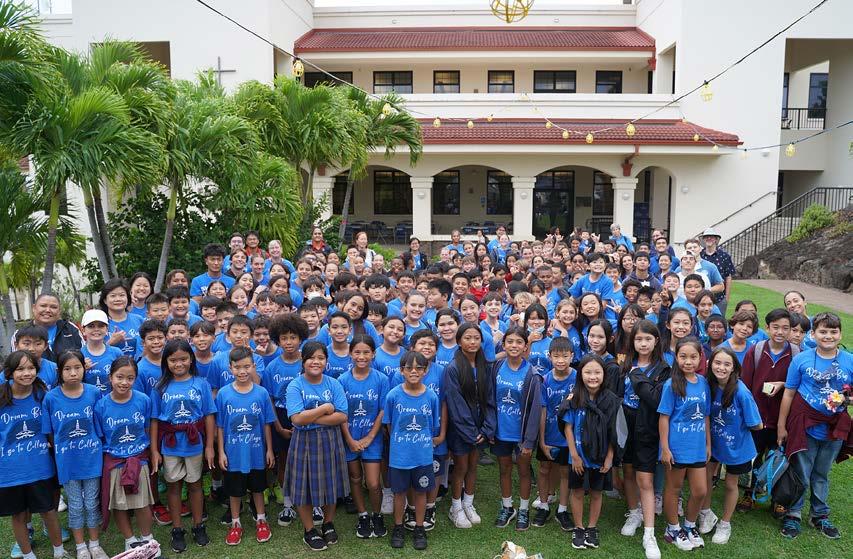

At its essence, an articulation agreement document serves as a formal arrangement between two colleges or universities, delineating a structured transfer plan for specific program offerings. The primary benefit of such an agreement lies in its assurance to students that all completed classes (credits) will transfer seamlessly to the intended destination institution. Moreover, it furnishes students with a clearly defined pathway for ongoing academic progression, thereby streamlining their transition to the next phase of their educational journey. Chaminade currently has articulation agreements not only with Hawai‘i’s community colleges but also with 11 different healthcare graduate schools across the nation, including in osteopathy and dentistry at A.T. Stillwell University, medicine at Boston University and George Washington University, and audiology, optometry and pharmacy at Pacific University. A recent contract with St. Mary’s University School of Law marks the first articulation agreement outside of the health professions field.
In a partnership between Hawai‘i Catholic Schools and Chaminade University, fifth graders have descended on campus twice in the past year, experiencing Chaminade life for one day by attending age-appropriate classes and receiving their diplomas. “The purpose of this program is to expose the students to college life at an early age, and to provide them with a day that is fun and eye-opening,” says Kim Baxter, Director of Early College programs at Chaminade. “Additionally, one benefit to offering visit opportunities for younger students is that when they return as juniors or seniors, the students will be better prepared to participate in traditional campus visit programs.”

Our collaborations with partners in education, healthcare, business and the nonprofit sector have yielded mutual benefits and positive outcomes for our community. As we continue to strengthen and expand our network of partnerships, we remain committed to making a meaningful difference in the lives of individuals and communities around the world. By embracing innovation, collaboration and social responsibility, we will continue to build upon our legacy of service and impact for generations to come.

The CIFAL Global Network (CGN) represents the United Nations Institute for Training and Research’s (UNITAR) global network of affiliated training centers, strategically positioned to assist local leaders in advancing sustainable development efforts. The central purpose of the CIFAL training programs is to develop and strengthen human capacities to better respond to development challenges and to facilitate City-to-City (C2C) partnerships. In today’s world, cities encounter myriad interconnected challenges spanning environmental, social and economic domains. With rapid urbanization persisting and shifts in multilateralism underway, cities have emerged as pivotal players on the global stage.
Within UNITAR, the CGN plays a distinctive role, enabling our presence at the city and municipality levels. This facilitates the effective engagement with key stakeholders, which is crucial to the realization of goals outlined in the 2030 Agenda for Sustainable Development.
CIFAL Honolulu is an incredibly well aligned initiative for Chaminade. We deem it as an extension of our University mission in many respects, but it is also an opportunity for us to be more intentional about our approach to sustainability and our contributions here within our local community in Hawai‘i and Pacific Island neighbors.

Chaminade is grateful to the foundations, organizations, families and individuals who fund our ability to continue our mission to transform lives through education. More than $23 million in grants were awarded to Chaminade in 2022–23.
In addition to the many individuals, families and friends, the funding came from the following groups:
Air Force Research Laboratory
Atherton Family Foundation
Frederic Duclos Barstow Foundation for American Samoans
The Samuel N. and Mary Castle Foundation
Chamber of Commerce (Congressionally Directed Spending)
Cooke Foundation, Ltd.
William H. Hannon Foundation
Hawai‘i Community Foundation
Kamehameha Schools
Kosasa Foundation
McInerny Foundation
Andrew W. Mellon Foundation
National Institutes of Health INBRE

National Institutes of Health PIKO
National Institute of Justice
National Science Foundation EPSCoR
National Science Foundation INCLUDES
National Science Foundation LSAMP
Sidney Stern Memorial Trust
Maurice and Joanna Sullivan Family Foundation
Mamoru and Aiko Takitani Foundation
U.S Department of Commerce's Minority Business Development Agency
U.S. Department of Education GEAR UP
Antone and Edene Vidinha Charitable Trust
J. Watumull Fund
GN Wilcox Trust
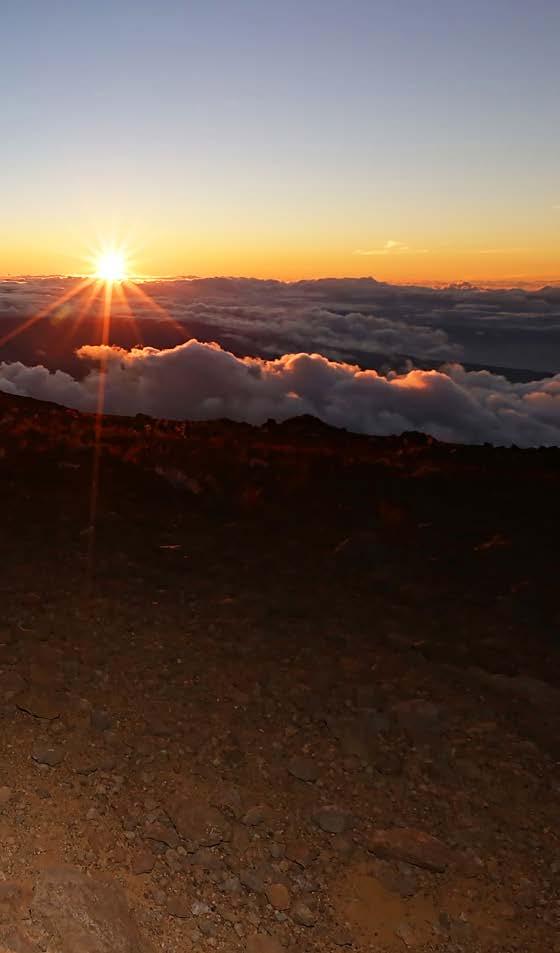

A Chaminade experience is more than transactional. It is transformational. The proof is evident in the growth of Chaminade’s alumni programs, outreach, as well as in fundraising and scholarship initiatives. Alumni cherish lifelong connections to Chaminade, and with the growth of alumni programs, their engagement with their alma mater has no limits.
The Chaminade Fund also continues to see growth in the number of donors and dollars. Overall, giving has seen a significant increase, allowing the University to offer financial aid through various scholarships and grants. These financial awards, often based on academic merit, financial need, or a combination of both, play a pivotal role in dismantling barriers to higher education. By providing financial assistance, scholarships enable deserving students to access resources, facilities and opportunities that would otherwise remain beyond their grasp.
BOARD OF REGENTS
Keiki-Pua S. Dancil, Ph.D., Chair
Violeta Arnobit
Gae Bergquist-Trommald
Carolyn Berry Wilson
Ismael Eustaquio ’88
John D. Field, Jr. M.B.A.’84
Lori Forman, Ph.D.
Eric Fujimoto, M.B.A. ’94
Rodney Harano, M.B.A. ’84
Melialani James
Estelle Kelley, J.D., M.B.A., Ph.D.
Karen Knudsen
Lydia Park Luis
Bro. Joseph Markel, S.M.
Bennette Misalucha
Lance Mizumoto, M.B.A. ’92
Jean Rolles, M.S.J.B.S. ’93
Alison Tanaka, M.B.A. ’15
David Underriner
Bro. Edward A. Violett, S.M.
Terrence L. Walsh ’93
Jeannine Monique Wiercinski
EX OFFICIO
Rev. Oscar Vasquez, S.M.
Bro. Jesse O’Neill, S.M.
Col. (Ret) Christine “Crissy” Gayagas, Ed.D. Chair, Board of Governors
David Carter, Ph.D.
Lynn M. Babington Ph.D. President
EMERITUS REGENT
Gary E. Liebl Chair Emeritus
Col. Christine M. Gayagas (Ret.), Ed.D Chair
Richard J. Blangiardi
John C. Brogan
Margery S. Bronster, Esq.
Sai Cheong Chui ’76, M.B.A. ’78
Bob Eisiminger
William H. Garrett
Robert S. Harrison
Warren H. Haruki
Gary G. Hogan
Matthew D. Howard ’89
Michael F. Kerr, J.D.
Anton Krucky
Lung-Nien Lee ’88
Blaine Rand Y. Lesnik, Psy.D. Dawn O. MacNaughton, M.B.A. ’93
RADM Joseph J. "Jim" McClelland, Jr. (Ret.)
Matthew J. Morgan, M.Ed. ’02
RADM Kenneth P. Moritsugu, M.D., M.P.H., F.A.C.P.M, U.S.P.H.S. (Ret.)
Donald D. Rodrigues
Richard E. Tanaka
Vaughn Vasconcellos
LTG Francis John Wiercinski (Ret.)
Albert Wong
EX OFFICIO
Lynn M. Babington Ph.D. President
Keiki-Pua S. Dancil, Ph.D.

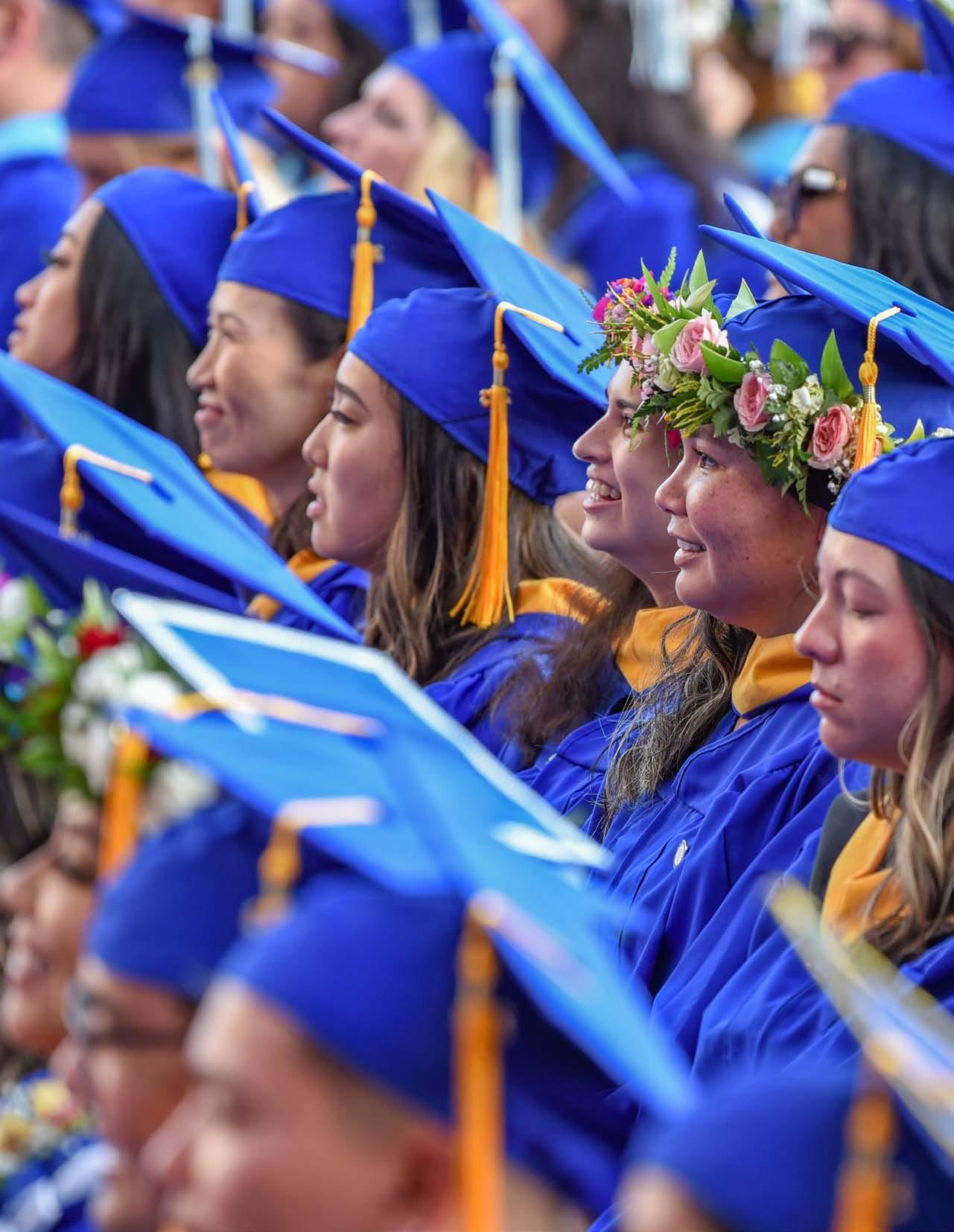
3140 Wai‘alae Avenue
Honolulu, Hawai‘i 96816-1578